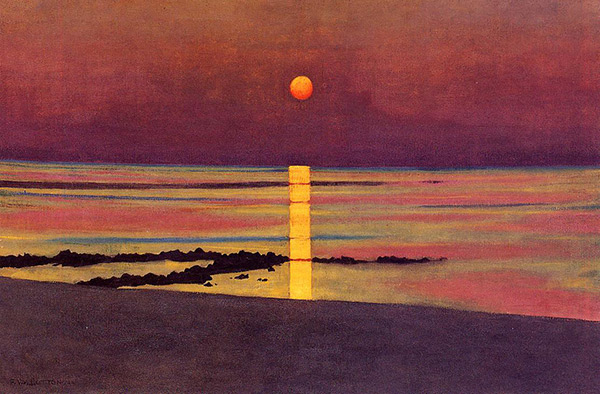Subtotal: $
Checkout
The End of the World Is Joy
The thought of the end must be grasped not in a passive and negative attitude of mind but creatively and positively.
By Nikolai Berdyaev
February 9, 2025
From the philosophical point of view, the end of the world and history is above all the triumph over objectivization, that is to say triumph over the world of alienation, necessity, impersonality, and hostility…. Classical culture would seek to petrify the world, to fix it in rigid forms, whereas the world ought in fact to be fused and molten in the fire. “I am come to send fire on the earth; and what will I, if it be already kindled?” (Luke 12:49). These words have been forgotten in objectivized, cooled Christianity. Man is crushed between two sinister infinities, and being in that position, desires so to order himself that he may not feel its tragedy.
The endless expanse of alien space filled Pascal with terror, but the endlessness of time in past and future is just as frightening. This double sinister infinity expresses itself in an existence which is projected into the external, that is to say in objectivized existence which is ever more and more disrupted from its noumenal core. In his discontent with the present, man turns either to the memory of a golden age in the past or to the expectation of a golden age in the future. Man is capable of imagining a better, and fairer, a more truthful and just life than this unpleasing life. But whence does he get power for such imagining? … Historical Christianity is coming to an end in its fated way, and the inevitable transition to eschatological Christianity is taking place. Rays of light shine from the future. The final future unites with the sources of the past. There are three stages of revelation: revelation in nature, revelation in history, and eschatological revelation. It is only in this last that God finally and fully reveals himself. This stage is preceded by a state of godforsakenness, by yearning anguish, by the mechanization and devastation of nature, by the mechanization and secularization of history, and by transition through a period of godlessness….

Félix Vallotton, Sunset, oil on canvas, 1913.
All efforts to create a new life, whether in historical Christianity, by social revolutions, or by the formation of sects and so forth, alike end in objectivization, and adaption to the dull, everyday normality. The old rises in new forms, the old inequality, love of power, luxury, schisms, and the rest. Life in our aeon is only a testing and a pathway, but the testing has a meaning and the path leads to a consummating end. It would become easier for man if he were aware of the fact that a further revelation of the unknown is at hand, a revelation not only of the Holy Spirit but of a new man and a new cosmos.
A passive and an active eschatology are both possible. In the majority of cases the apocalyptic frame of mind has led to a passive waiting for the end, and a refusal to face the problems of history…. Apocalyptic time is interpreted as a time of mere waiting for, and submitting to, the action of divine and diabolic powers. This is a decadent temper of mind. But an active eschatology is possible; and that imposes a knowledge of self which answers to the dignity of man as free spirit. It asserts the need to strengthen human activity and human creativeness when the end comes. The thought of the end must be grasped not in a passive and negative attitude of mind but creatively and positively. I have already said that every creative act of man is eschatological in character and brings this world to an end. The end is interpreted in different ways according to whether man looks at it from the point of view of historical Christianity, or from that of the more complete revelation of the Spirit….
The greatest religious and moral truth to which man must grow is that we cannot be saved individually. My salvation presupposes the salvation of others also, the salvation of my neighbor, it presupposes universal salvation, the salvation of the whole world, the transfiguration of the world. The very idea of salvation arises from the oppressed condition of man; and it is associated with a forensic conception of Christianity. This ought to be replaced by the idea of creative transformation and enlightenment, by the idea of perfecting all life. “Behold I make all things new.” It is not only God who makes all things new, it is man too. The period of the end is not only a period of destruction, but also a period of divine-human creativeness, a new life and a new world. The church of the New Testament was a symbolic image of the eternal church of the Spirit. In the church of the Spirit the eternal gospel will be read. When we draw near to the eternal kingdom of the Spirit the torturing contradictions of life will be overcome and sufferings, which toward the end will be increased, will pass into their antithesis, into joy. And this will be the case not only for the future but also for the past, for there will be a reversal of time and all living things will share in the end.
Nikolai Berdyaev, The Divine and the Human, trans. R. M. French (Geoffrey Bles, 1949), 197–202.
Already a subscriber? Sign in
Try 3 months of unlimited access. Start your FREE TRIAL today. Cancel anytime.






